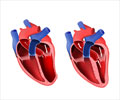Australian researchers claim to have developed a drug that can dramatically reduce heart muscle damage after a heart attack by targeting a master disease-causing gene.
Australian researchers claim to have developed a drug that can dramatically reduce heart muscle damage after a heart attack by targeting a master disease-causing gene.
Trials show that the drug, known as Dz13, specifically targets and neutralises the master regulator c-Jun gene, which is responsible for inflammation and muscle death in the aftermath of a heart attack.The drug also reduces incidental cell and tissue death resulting from life-saving interventions such as balloon angioplasty and stent placements, or from the delivery of clot-busting drugs.
Significantly, the heart’s pumping action is protected by the drug, dramatically improving the patient’s chances of a full recovery after a heart attack.
“While this drug doesn’t prevent the heart attack, it does reduce the damaging effects of the blockage on the heart once it’s happened,” said lead investigator Professor Levon Khachigian, from the Centre for Vascular Research in the University of New South Wales.
“It’s a targeted therapy that can be used to complement other procedures and improve chances of a normal recovery,” he said.
Safety trials of Dz13 are now underway ahead of Phase 1 human trials. A paper outlining the animal study appears this month in the high-impact cardiovascular journal Arteriosclerosis, Thrombosis and Vascular Biology.
Advertisement
“At both these times a range of potentially damaging coordinated molecular responses kick in,” Professor Khachigian explained.
Advertisement
Co-author on the study, interventional cardiologist Dr Ravinay Bhindi from Royal North Shore Hospital, said the technique represents an important potential advance in the treatment of heart disease, which is Australia’s number one killer.
“There remains a clinical need for improved therapies. Mortality and morbidity have been relatively static in heart disease despite improvements in treatment,” Dr Bhindi said.
“This drug not only structurally reduces heart attack size but it protects heart muscle function. Both those things in combination improve outcomes and give hope to patients.”
Dr Bhindi said the process was attractive because it is so selective.
“The drug minimises potential side-effects because it targets only a master switch gene which is only turned on in cells affected by the heart attack and can be delivered directly to a localised area at the most clinically relevant time,” he said.
Professor Khachigian said other, independent trials of Dz13 were about to get underway to target c-Jun in a range of diseases, from skin cancers to eye disorders.
“Our discovery means that heart attack patients may also benefit from Dz13.
“These drugs are relatively easy to make and deliver, and there are no known safety issues,” he said.
The study was supported by funding from the National Health and Medical Research Council and the National Heart Foundation. Professor Khachigian is an Australian Fellow of the NHMRC.
Source-Medindia
GPL












